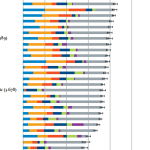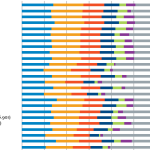Tourism
now browsing by category
Why CNRP is pushing hard from bottom-up TV investment?
Why CNRP is pushing hard from bottom-up TV investment?
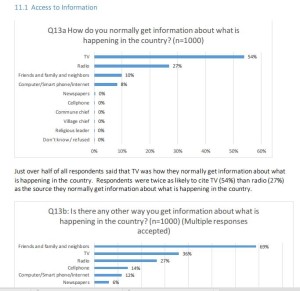 TV station is one of the results from the political deal in July 22, 2014. One year anniversary of this political settlement between CPP and CNRP has resulted in both progress and regress outcomes. But the grand policies CNRP are aiming to achieve have not been changed. Those grand policies are following:
TV station is one of the results from the political deal in July 22, 2014. One year anniversary of this political settlement between CPP and CNRP has resulted in both progress and regress outcomes. But the grand policies CNRP are aiming to achieve have not been changed. Those grand policies are following:
- 7 points policy to bringing about change for Cambodia remains the same. These policies shook the base of CPP in 2013 and they should be more effective in 2017 and 2018 of upcoming elections when these grand 7 points policies have been paid a price through more in-dept and comprehensive galvanization.
- The culture of dialogue to paving way for comprehensive and skillful interaction between top leaders of CPP and CNRP to maximize the interests of the nation is still intact and stronger. The dialogue is a good political mean for both parties to prepare the homestretch in 2018. Those who are regarded as disrespectful to this dialogue shall face with stronger condemnation by the Cambodian people.
- Sun TV Channel to adding on to those existing 18 TV channels in Cambodia is a powerful ongoing project. Sun TV Station has appeared as a pro-poor, neutral, professional and pre-owned channel by the Cambodian people.
According to the survey by Asia Foundation, there is above 50% of population are watching TV in daily basis. So this highest proportional market share of Cambodia media, CNRP is not going to waste its energy and investment in capitalizing to create the TV channel. The investment’s business plan is different from others as this channel is not owned by tycoons or powerful politicians, but owned by the Cambodian people who donated money in kind to supplement with the shares invested by many individuals.
This donation and share’s participation rights shall help to enable the Sun TV Channel become true governing by the Cambodian people, for the Cambodian people, and serve the Cambodian people.
Posted in Culture, Curriculum Vitae (CV), Economics, Education, Environment, Internet, KR Trial, Leadership, Politics, Researches, Social, Tourism | Comments Off on Why CNRP is pushing hard from bottom-up TV investment?
Tags: Sun TV Channel
Policy Platform through the Survey of Asia Foundation
Arguing towards this research finding by Asia Foundation resonates different aspects. While the finding is very crucial for policy maker(s) to determine their policy platform, the finding doesn’t help much in crafting “institution” but it has helped a lot regarding public opinion for political parties. This research (survey) couldn’t avoid from bias and deviation within the nature of population sampling, technicality, and methodology. In a nation-state of democratic principles that consists of two-ways communication: state-people and people-state, this research is purely focusing on people-state channel, thus it is hard to comprehend the effective approach in “capacity building on state-institution”.
I am keep to articulate more in “state-institution” building which importantly relies on the equity of the state-approached and people-approached participation. It is nice to read the lacking of trust of Cambodian people towards the institution with many clauses of recommendation to bringing about trust from the people. But it is a jargon to read lengthy description on people’s bad mentality towards institutional corruption without having people’s self-responsiveness to discourage corruption, for instance “no bribe, no corruption” etc.
Cambodia is lacking nation founding father. Cambodia is fulfilled personal-cult founding fathers. By evidence, founding father have projected long term interest for the nation such as paving strong foundation for Cambodia as a nation-state to having strong institution accounting from neutral media to educate the public, to political parties system of sound balanced government party leadership and opposition party leadership, to building trust in between state and society etc. Now, government leadership party can enjoy all the provisions in term of party’s base of people-networking, media and financial injection, the opposition party is non-available at all in term of state’s funding while the party has wholly relied on generosity and donation in kind from the members. This kind of political system is not existing in civilized democratic countries. And this culture of non-equity political system shall not sustain Cambodia in its long term democratic system at all.
Interestingly, the research didn’t involve itself towards the new political concept and philosophy conundrum of “Culture of Dialogue” at all. It is probably the concept itself is too complicate for the researches design or the researchers missed to add into their questionnaires just one clause or one word “culture of dialogue”. I am keen to see the researches related this to their questionnaires so that “social capital” of “trust” might be enriched among those respondents.
To recap, I copied and pasted the key ideas in here for everyone to digest more. The research is shedding light towards political parties, academia and news outlets. It is hugely benefiting those “think tank” to think about embodying themselves to be “nation founding father”, or at least “to avail themselves for critical thinking” through word of mouth, facebook, blog, workshop, writing to the editor, or other simple sharing etc.
Democracy in Cambodia2014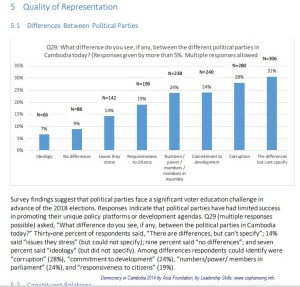 …the majority of respondents in the 2014 survey said the country is headed in the wrong direction.
…the majority of respondents in the 2014 survey said the country is headed in the wrong direction.
…the survey findings suggest the July 2014 agreement was popular on at least two accounts: first, the majority of respondents support a constitutional amendment to provide for a “balanced” National Election Committee; second, the majority of respondents believe that electoral reform should take place before elections.
Posted in Culture, Economics, Education, Environment, Leadership, Politics, Researches, Social, Tourism | Comments Off on Policy Platform through the Survey of Asia Foundation
ស្ថិតនៅក្រោម១៤៥សំរាប់សេចក្តីសុខរបស់ប្រជាជនកម្ពុជា
ការសិក្សាថ្មីៗរបស់អ្នកស្រាវជ្រាវកំរិតស្តង់ដារពីភពលោកមានបង្ហាញស្ថិតិថ្មីសំរាប់ប្រទេសដែលមានសេចក្តីសុខខ្ពស់បំផុតនិងប្រទេសដែលមានសេចក្តីទាបបំផុត។
ក្នុងចំណោមប្រទេសដែលបានសិក្សាចំនួន១៥៨ប្រទេសជុំវិញពិភពលោក ប្រស្វីសជាប់ចំណាត់ថ្នាក់លេខ១ ប្រទេសកាណាដាលេខ៥ ក្នុងខណៈពេលដែលប្រទេសសហរដ្ឋអាមេរិកលេខ១៥។ ចំណែកប្រទេសកម្ពុជាគឺស្ថិតក្នុងលេខ១៤៥។
យ៉ាងណាក៏ដោយការសិក្សាដាច់ឡែកមួយទៀតបោះពុម្ពផ្សាយតាមបណ្តាញអិនតេីរនិតក្នុងខែតុលា ២០១៤ បញ្ជាក់ថាកម្ពុជាជាប់លេខពីររឿងពុករលួយក្នុងចំណោម១៥ប្រទេសដែលអាក្រក់ជាងគេបង្អស់ក្នុងពិភពលលោក។
Posted in Culture, Economics, Education, Leadership, Politics, Researches, Social, Tourism | Comments Off on ស្ថិតនៅក្រោម១៤៥សំរាប់សេចក្តីសុខរបស់ប្រជាជនកម្ពុជា
Tags: Corruption Index, happiness is contagous
Cambodia’s Enigma by John Tully
ប្រាងប្រាសាទខ្មែរនិងរបបវាលពិឃាដ ទឹកទន្លេស័ក្តិសិទ្ធនិងព្រៃឈេីដេីរលុយមិនរួច អតីតកាលដែលពោរពេញទៅដោយភាពមហស្ចារ្យនិងភាពអម៉ាស….ប្រទេសកម្ពុជាគឺដែនដីនៃទឡ្ហីកម្ម។ សហស្សវត្សន៍កន្លងផុតទៅ ទីនេះគឺជាមហាអាណាចក្ររីកចំរេីនខ្ពស់ត្រដែតប្រកបដោយអំណាច ស្ថាបនាទីធ្លាប្រាសាទដ៏ធំស្កឹមស្កៃ។ សព្វថ្ងៃនេះ មួយពាន់ឆ្នាំកន្លងមក ត្រូវបានបំផ្លិចបំផ្លាញដោយជំលោះនិងសង្គ្រាមមហាវិនាសកម្ម ប្រទេសខ្មែរកំពុងតស៑ូក្រាញននៀលដេីម្បីប្រជាធិបតេយ្យ ហេីយស្ថិតក្នុងតំបន់ទាបបំផុតនៃចរន្តសេដ្ឋកិច្ចពិភពលោក។ កម្ពុជានៅជាប្រស្នាសំងាត់គួរអោយចាប់អារម្មណ៍សំរាប់ពិភពខាងក្រៅ។ ជាមួយនឹងទំព័រប្រវត្តិសាស្រ្តគួរអោយរន្ធត់នៃសង្គ្រាម ភាពអត់ឃ្លាន និងអំពេីឈ្លានពានបរទេសដែលបានគំរាមទៅរកមរណៈភាព ភាពបន្តដង្ហេីមរស់របស់កម្ពជាគឺជាសក្ខីភាពរបស់មនុស្សជាតិក្នុងការប្រឹងរស់អោយខាងតែបាន។ ដោយចន ធូលី ៚ បកប្រែដោយសេង សុភ័ណ
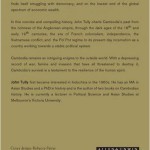 Temples and killing fields, mighty rivers and impenetrable forests, a past filled with glory and decline…Cambodia is a land of contrasts. A millennium ago it was an empire at the height of its power, building the vast temple complexes of Angkor. Now, a thousand years later, ravaged by conflict and a genocidal civil war, Cambodia finds itself struggling with democracy, and on the lowest end of the global spectrum of economic wealth.
Temples and killing fields, mighty rivers and impenetrable forests, a past filled with glory and decline…Cambodia is a land of contrasts. A millennium ago it was an empire at the height of its power, building the vast temple complexes of Angkor. Now, a thousand years later, ravaged by conflict and a genocidal civil war, Cambodia finds itself struggling with democracy, and on the lowest end of the global spectrum of economic wealth.
Cambodia remains an intriguing enigma to the outside world. With a depressing record of war, famine and invasion that have all threatened to destroy it, Cambodia’s survival is a testament to the resilience of the human spirit.
By John Tully (2005) in his book “A Short History of Cambodia: from Empire to Survival”.
Posted in Culture, Economics, Education, Leadership, Politics, Researches, Social, Tourism | Comments Off on Cambodia’s Enigma by John Tully
Tags: David Chandler, John Tully, Sorpong Peou












